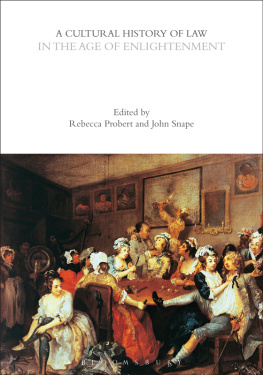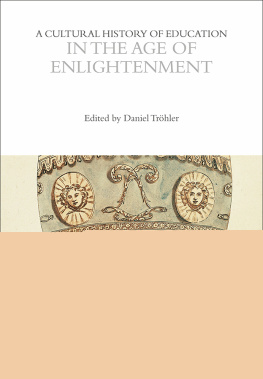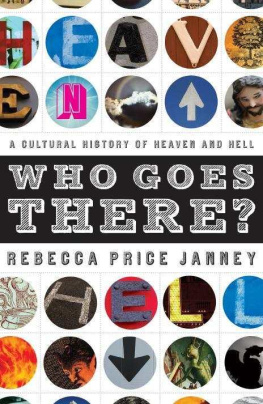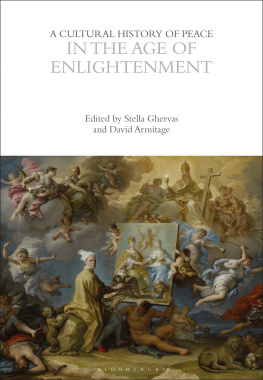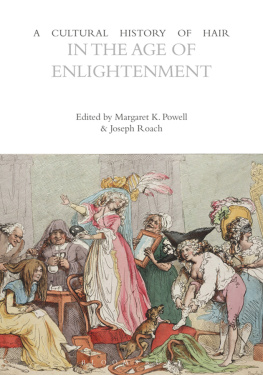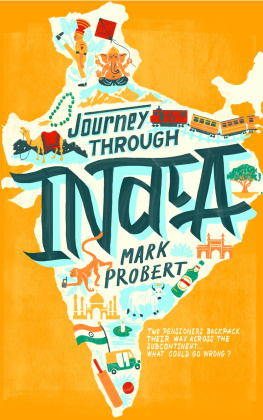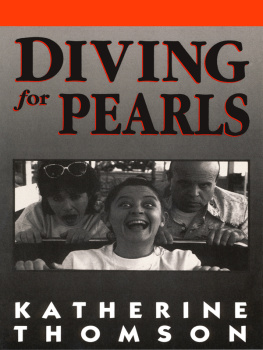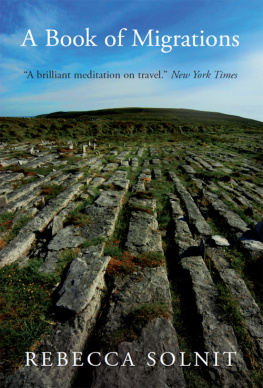A CULTURAL HISTORY OF LAW
VOLUME 4
A Cultural History of Law
General Editor: Gary Watt
Volume 1
A Cultural History of Law in Antiquity
Edited by Julen Etxabe
Volume 2
A Cultural History of Law in the Middle Ages
Edited by Emanuele Conte and Laurent Mayali
Volume 3
A Cultural History of Law in the Early Modern Age
Edited by Peter Goodrich
Volume 4
A Cultural History of Law in the Age of Enlightenment
Edited by Rebecca Probert and John Snape
Volume 5
A Cultural History of Law in the Age of Reform
Edited by Ian Ward
Volume 6
A Cultural History of Law in the Modern Age
Edited by Richard K. Sherwin and Danielle Celermajer
Steve Banks is Associate Professor of Law at the University of Reading. He works mainly on the role of violence in social ordering and in the field of British Legal History. Among his publications are A Polite Exchange of Bullets: The Duel and the English Gentleman (2010) and Informal Justice in England and Wales, 17601914: The Courts of Popular Opinion (2014).
Timothy J. Dodsworth is a lecturer at the University of Exeter and researches mainly in comparative contract law. He completed his Ph.D. on the underlying values of German and English contract law in 2015.
James Oldham is St. Thomas More Professor of Law and Legal History at Georgetown Law School. He is the author of The Mansfield Manuscripts and the Growth of English Law in the Eighteenth Century, 2 vols. (1992) and English Common Law in the Age of Mansfield (2004), both titles in the Studies in Legal History series published by the University of North Carolina Press in association with the American Society for Legal History. He is also the editor of volume 128 in the main series published by the Selden Society, Case-notes of Sir Soulden Lawrence, 17871800 (2013).
Ruth Paley worked on the History of Parliament project, focusing on those peers and bishops who had significant interactions with the law. Her personal research interests are in the social history of the law with particular reference to the administration of criminal justice in eighteenth-century London.
Rebecca Probert is Professor of Law at the University of Exeter. Her research focuses on the history of marriage, bigamy, divorce and cohabitation and she is the author of numerous articles and books, including Marriage Law and Practice in the Long Eighteenth Century: A Reassessment (2009) and The Legal Regulation of Cohabitation: From Fornicators to Family, 16002010 (2012), both published by Cambridge University Press.
Dana Rabin is an Associate Professor of history at the University of Illinois, Urbana-Champaign, where she teaches global history, British history, and the history of crime. She is the author of Identity, Crime, and Legal Responsibility in Eighteenth-Century England (2004) and Britain and its Internal Others, 17501800: Under Rule of Law (2017).
Julia Rudolph is Professor of History at North Carolina State University. Her major publications include Revolution by Degrees: James Tyrrell and Whig Political Thought in the Late Seventeenth Century (2002), ed. History and Nation (2006), and Common Law and Enlightenment in England, 16891750 (2013). Her books and articles explore constitutional law, gender and criminal law, property theory, legal publishing, forensic science and conceptions of fact and, finally and most broadly, the long history of common law jurisprudence. Many of these themes inform her current research into mortgage, empire, and the history of political economy.
John Snape is an Associate Professor of Law at Warwick Law School, University of Warwick. A specialist in tax law, its history and in the history of property law and tax law ideas, he has written on Grotius, Locke (with Jane Frecknall Hughes), Montesquieu, and Hume. His books include (with Jeremy de Souza), Environmental Taxation Law (2006), (with Gary Watt) How To Moot (2nd edn, 2010), and the monograph The Political Economy of Corporation Tax (2011). He has recently edited (with Dominic de Cogan as co-editor), Landmark Cases in Revenue Law (forthcoming) and is currently working on a monograph about tax in corporate transactions. His work on Handels Solomon combines his interest in the eighteenth century with a love of Handels music that goes back many years.
The six volumes in A Cultural History of Law present a panorama of laws cultural significance over the span of several centuries, especially as it relates to the place of law in the arts and humanities. Each volume focuses on a distinct time period from antiquity to modernity and in each volume a chapter is devoted to one of eight legally significant themes: Justice, Constitution, Codes, Agreements, Arguments, Property and Possession, Wrongs and The Legal Profession. The collection does not seek to provide encyclopedic coverage, but rather to present cultural case studies that highlight how particular cultural artifacts express and explore the key legaland inevitably the key political and socialconcerns of their time. The authors have picked flowers from their field of expertisea play, a painting, a mosaic, a book, a filmwhich bring into close focus the cultural and legal flourishing of the time. The volume editors are internationally distinguished scholars with a passion and deep appreciation for the law and culture of their chosen period. Together with the experts that they have assembled to contribute chapters on the eight themes, they are reliable guides not merely to the facts about each period but to the feel of each period. Every volume has an ethos and a style that immerses the reader in the distinctive quality of its era. The series is indebted to the archivists concern to discover and catalog historical materials, but what sets it apart is its concern to show how the materials of history are materially meaningful. In this way, our retrospective of more than 2,000 years continues to have relevance for lawyers and for all culturally concerned citizens today.
Sometimes we find that artifacts have lost the cultural meanings that first produced them. Likewise, we sometimes we find that artifacts are culturally meaningful today in ways that they were not at the time of their creation. Take the example of Magna CartaThe Great Charter of King John of England sealed at Runnymede on the Thames in 1215. Today, in the United States in particular, Magna Carta has been hoisted to totemic heights in the cultural imagination. It might therefore seem strange to us that William Shakespeares play King John makes no reference at all to this great artifact. The reason for its omission is that for Shakespeare and his early modern contemporaries, the most dramatic historical event in the reign of King John was his surrender of the crown to the papal legate and his receiving it again as a papal vassal. The modern significance of Magna Carta is largely a post-Enlightenment invention and its principal promoters were the great myth-makers who framed the American constitution and created the idea of the United States. It is some proof of this that the Magna Carta memorial which stands at Runnymede today was erected by the American Bar Association. The small-scale temple, like the much larger Jefferson Memorial in Washington DC, has become a place of secular pilgrimage; a sanctuary to the values of political freedom and human rights under law.



